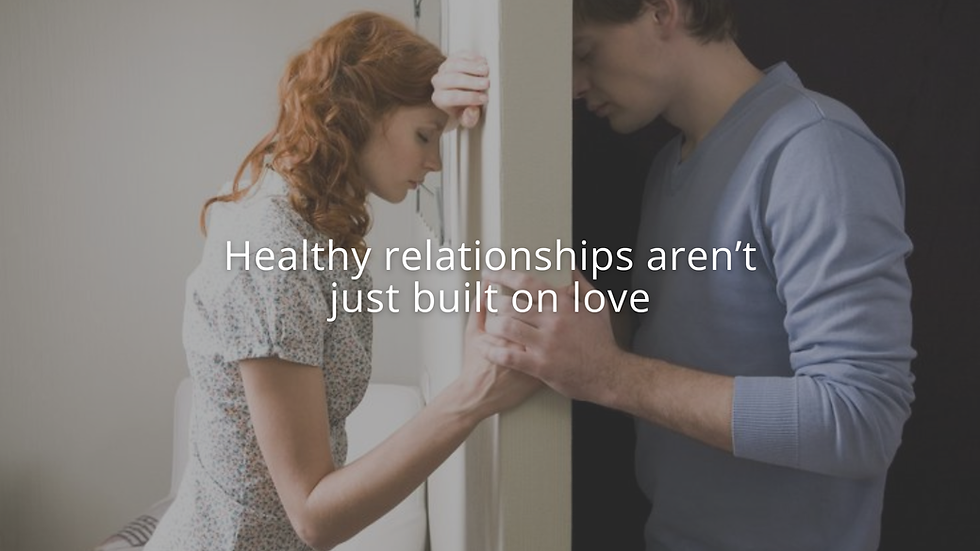Is it okay to stay in a relationship even if you're no longer in love?
- Mar 18, 2025
- 4 min read

Relationships are full of large, complicated, and frequently difficult questions that do not always have easy answers. One of the most frequently asked quesstions in my practice is: Is it okay to stay in a relationship if you are no longer in love?
Many people struggle with this issue, and the solution is not black and white. So let's unpack it together.
The Evolution of Love.
First, let's define love. There's that thrilling, can't-get-enough-of-each-other stage. Then there's the constant, deep affection that develops with time. They don't always appear the same, which can be confusing.
Love evolves, and so do relationships. The excitement of being in something new may diminish, but that doesn't mean love has vanished; it may simply take on a new form. Work, kids, and life in general influence how we express and experience love. Some people misinterpret this shift for falling out of love when, in reality, They simply stopped cultivating the relationship.
I often say, "Love never dies…it just gets neglected." I once worked with a couple who thought they had fallen out of love, but as we looked deeper, we discovered that love had not vanished—it had simply been buried behind habit, worry, and a lack of conscious effort.
So, how can you tell whether you're falling out of love or simply caught in a rut?
Signs of Falling Out of Love vs. Being in a Rut
If you're not sure where you stand, here are some key indicators:
Signs You are in a rut (and can fix it):
👉 Emotional Distance
👉 Conversations feel shallow or just functional.
👉 You feel lonely even when you are together.
👉 Lack of excitement
👉 You're no longer looking forward to spending time together.
👉 Small actions of gratitude are missing.
👉 Decreased physical and emotional intimacy
👉 Affection feels forced or has disappeared.
👉 Emotional vulnerability is sometimes difficult.
👉 Increased irritation
👉 Things that never bothered you before suddenly do.
👉 Arguments appear repetitious or tedious.
Signs You Could Be Emotionally Checked Out:
👉 Escapism and Fantasy.
👉 You daydream of living without your partner.
👉 You seek emotional connection elsewhere.
👉 Lack of effort or investment
👉 You're no longer trying to improve things.
👉 Future plans feel more like obligations than things to look forward to.
Recognising these signals are the first step. But now comes the main question: why do people stay?
Why do people stay in unfulfilling relationships?
The reasons why people stay in relationships after love fades are varied and deeply personal. They are typically divided into two categories: external causes (family, finances, social pressure) and internal difficulties (fear, self-esteem, comfort).
External Reasons People Stay:
👉 Child and Family Stability
👉 Worried about the emotional impact on children.
👉 Avoiding custody disputes and disturbing habits.
👉 Intertwined Lives and Responsibilities.
👉 Owning a property, owning a business, or sharing money.
👉 Social circles that make splitting up feel even more difficult.
👉 Cultural and Social Expectations
👉 Family or religious pressure to remain together.
👉 Fear of being judged or labelled as a failure.
👉 Guilt and Responsibility
👉 They do not want to hurt their partner.
👉 They feel responsible for their partner's happiness.
👉 Hoping for Change
👉 Remembering how things used to be.
👉 Hoping that time will heal everything (spoiler: it typically doesn't).
Internal Reasons People Stay: Denial and Avoidance:
👉 Not wanting to confront painful emotions.
👉 They are diverting their attention away from the issue at hand.
👉 Comfort and Routine
👉 Fear of beginning afresh.
👉 Preferring familiarity to uncertainty.
👉 Fear of loneliness.
👉 They are worried that they will not be able to find someone else.
👉 Associating being single with failure.
👉 Financial Dependence
👉 Anxiety about financial security after the separation.
👉 Low self-esteem.
👉 Believing they do not deserve better.
👉 I feel like leaving would be a personal failure.
What's the truth? Staying is not always about love. Sometimes it's out of fear, obligation, or convenience. The crucial question is whether you're staying for the correct reasons or to escape the painful truth.
Commitment versus Emotional Fulfilment
Should commitment trump happiness? Some say yes—love is more than simply a sensation; it is a decision, an effort. Others feel that being in a relationship without an emotional connection causes anger, loneliness, and even depression.
Consider this: How would you redefine love?
Can love exist without passion?
Can a relationship thrive only on mutual respect, friendship, and shared goals?
I've witnessed couples rekindle their relationship by shifting their focus from what's missing to what's possible. However, commitment without fulfilment can feel like a prison. Staying for duty alone is not always the best option.
At the end of the day, ask yourself: Are you staying because you want to make things better? or Are you staying because you're afraid to leave?
Final Thoughts: Stay or Go?
Not every relationship is meant to last forever, and that's fine. Some can be rekindled via effort and conversation. Others have run their course, and letting go is the healthiest decision.
If you stay, do it because there is still love, respect, and a desire to make things work. If you leave, do so with dignity, honesty, and compassion.
What's most important? Make your well-being a priority. Your happiness matters. Your emotional security is important. No relationship should disrupt your peace.
If you need support in navigating this, therapy can help. You don’t have to figure it out alone. You can listen to the full episode on our podcast or book a session with me or my amazing team. Contact us today.
Tune in here:




Comments